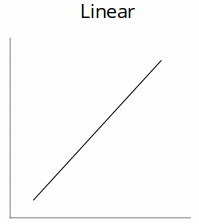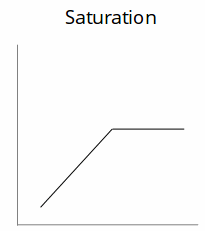Stop before you ruin it: Math that improves your life
Do you hate doing things that take effort and get you no results?
You’re probably doing it a lot without realizing it, especially if you don’t understand this simple concept I’ll illustrate below.
If you’d like to stop wasting your time, energy, and other resources on things that don’t help your life, read on.
Some things work like this:

If the temperature goes up in Fahrenheit, it also goes up in Celsius. If you work more hours and you get paid by the hour, you’ll get paid more. It illustrates cases where what you put in, you get out. We call it “linear” because it looks like a line.
Not everything works this way. If you don’t get enough vitamin C, your health improves when you take in more of it. But after a certain amount, more doesn’t improve your health.
Ingesting vitamin C works more like this:

I simplified the graph, but it basically shows that when you that after you reach a saturation point, putting in more doesn’t get any more results. It’s like getting a sponge or towel wet. After it’s full, or saturated, it won’t get any more wet. Hence the term “saturation.”
Thinking that things that saturate work linearly can lead you to mess up parts of your life, and prevent you from improving things. Here are some examples I’ve found. Your experience may differ.
Example 1: Money and happiness
If you can’t afford your rent or to buy food, having more money will improve your life. Once you’ve covered your basics, I predict that putting more effort into making more money won’t create more happiness for you.
If putting effort into money distracts you from improving your life in other ways, this misunderstanding of the two patterns can hurt your life.
Example 1a: Material possessions and happiness
If you don’t have a pot to reheat food in, your mental state will likely suffer, so getting one will probably help. Once you’ve covered your basics, I predict getting more and more stuff won’t create more happiness.
Having too much stuff can distract you from what’s important as much as having too little.
Example 2: Nutrients and health
Check with your medical doctor, who will know more than I do, but I understand that most nutrients work like vitamin C. Getting below a certain amount undermines your health, but getting more doesn’t improve it.
A whole industry saps money from people who don’t understand this concept, selling ineffective dietary supplements, like a tax on ignorance. That industry also distracts people from things, like exercise and education, that improve health more than many things they claim to but don’t.
The same holds for water, and the saturation threshold for people who aren’t in deserts is far below eight cups a day. Moreover, your body’s thirst mechanism tells you when you’re low on water. Yet millions of people drink more water than necessary, wasting resources and polluting.
Example 3: Exercise and fitness
If you never exercise, starting to will help. After a certain point, too much exercise deprives your body of the time it needs to grow.
Example 4: Time together and enjoyment
Seeing family during the holidays is a joy for many. More time doesn’t always create more joy. The same follows for time with significant others and other friends.
Can you think of other examples?
Can you think of other examples? I’d love to hear of ones I hadn’t thought of.
Caveat
Many things are linear, so I don’t recommend assuming everything saturates. Only to consider that many things might. Likewise, many things are neither linear nor do they saturate.
Read my weekly newsletter

On initiative, leadership, the environment, and burpees
Pingback: Stop before you ruin things, part 2: a reader's additions - Joshua Spodek